-
 Return Gifts for Birthday and Kids' Party Planning: 10 Great Gift Ideas Under Rs 100 and Rs 200 & Awesome Party Hacks
Return Gifts for Birthday and Kids' Party Planning: 10 Great Gift Ideas Under Rs 100 and Rs 200 & Awesome Party Hacks
-
 Don't Wait Any Longer To Show Your Affection Towards Loved Ones! Send In These Ramadan Greeting Right Now! Wish Your Loved Ones With These Greetings For The Blessed Month!
Don't Wait Any Longer To Show Your Affection Towards Loved Ones! Send In These Ramadan Greeting Right Now! Wish Your Loved Ones With These Greetings For The Blessed Month!
-
 Want a Safe, Non-Toxic Slime Recipe without Borax or Glue? Here are 10 Recipes for Making Slime, Many with Edible Ingredients!
Want a Safe, Non-Toxic Slime Recipe without Borax or Glue? Here are 10 Recipes for Making Slime, Many with Edible Ingredients!
What’s Down Syndrome?
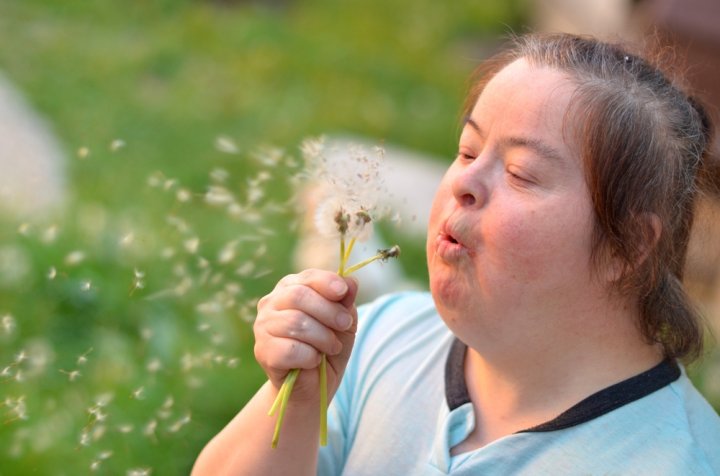
Down syndrome is not an illness. It is a genetic condition caused by the presence of an extra chromosome, which is chromosome 21. This chromosome affects the development of the child physically and intellectually. The child with Down syndrome also tends to develop several health problems.
Every cell in the body contains 46 chromosomes, 23 are inherited from the mother and 23 from the father. In some cases, an extra copy of chromosome 21 is passed down and this leads to Down syndrome.
What Causes Down Syndrome?
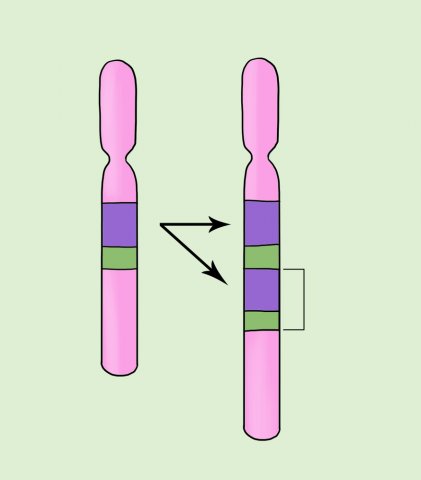
The doctors do not know what causes this phenomenon exactly, but women who conceive after the age of 35 years have a higher chance of giving birth to a baby with Down syndrome.
Also, if parents already have a child with Down syndrome then it is likely that the next baby will also develop this condition. There are also claims that say Down syndrome can be passed from parent to child through ‘translocated’ genes.
Why are Babies Born with Down Syndrome?

Down syndrome occurs due to abnormal cell division of chromosome 21, which is responsible for the developmental problems in Down syndrome. Following are the genetic variations in chromosome 21 that leads to the down syndrome:
- Trisomy 21: According to studies, Trisomy 21 is the reason for the development of Down syndrome in about 95% of the time. Trisomy 21 occurs when a baby has 3 copies of chromosome 21 instead of 2 copies. This is could be the result of abnormal cell division during the development of sperm cell or egg cell.
- Translocation Down Syndrome: When a part of chromosome 21 gets attached to another chromosome before or during the conception can also lead to Down syndrome. Though the child only has 2 copies of chromosome 21, this extra part of chromosome 21 attached to another chromosome causes Down syndrome.
- Mosaic Down Syndrome: This type of Down syndrome is rare and is caused when only some cells have an extra copy of chromosome 21 in them while the rest are normal. This is due to abnormal cell division after fertilization.
How Will Down Syndrome Affect the Development of the Child?

Children with Down syndrome usually learn and develop slower compared to other children. The abnormality is caused during cell division resulting in one extra chromosome 21, which leads to Down syndrome. Cognitive and behavioural aspects of these kids are also quite different and slow compared the other children. Here are some of the effects Down syndrome has on the development of the child:
- Motor Skills Motor development is slower in children with Down syndrome. This will considerably reduce the opportunities for kids to explore and understand the world, it directly affects their cognitive development. There is also an impact on language learning skills due to poor oral motor skills.
- Speech Clarity They show a delay in learning to use the language to what they want to comprehend. They face difficulty in collecting the words to form a sentence with grammar. They also have difficulty speaking clearly. The gap usually found between the thought and speech often results in frustration and behavioural issues. This will lead to the child being underestimated for his/her cognitive abilities.
- Verbal Memory The ability to process visual information is better in the child with Down syndrome, whereas they find difficult to process verbal information and are able to retain this memory only for a short while. This makes it difficult for them to learn the language and can affect learning in the classroom.
- Number Skills The ability of children with Down syndrome to learn numbers is approximately two years behind their reading skills. They struggle to learn numbers and retain them in their memory.
Parenting a Downs Syndrome Child – Difficulties and Challenges

Parenting is a difficult task as it is with work, juggling schools, sports, extracurricular activities, and more. However, all these get even more complicated when you have a child with Down syndrome due to frequent visits to doctors and therapists. You may find it difficult at first but will definitely ease into it with time.
- Be Aware
There is so much misleading information out there and some can be quite disturbing for the parent. Find the right source to get information from and be oblivious to the rest and focus on your child. The most reliable is our doctor or therapist, books, and government websites. Learn your child’s condition in detail and understand your role in how to make the quality of life better for them. - Share and Seek Help When Needed
There are many parents and family out there, who are going through the same thing as you are. So, do not be shy to join these communities and share your experience. They can also be a great source of help when needed as they understand the situation you are in. - Regular Visits to Doctor/Therapist
There are different sets of guidelines for children with Down syndrome compared to the ones without. So, find the right doctor/therapist and be regular with your appointments. Even a single visit can have an impact on the child’s development. Although there is a requirement of many doctors and therapists, find a hospital where you can find them all under one roof to make it simpler. - Prioritize Communication
Children with Down syndrome have difficulty in speech due to slow growth in the development of their motor skills. Speech therapists can help you in this regard, always prioritize communication because children love to talk and communicate, but it is frustrating for the child when he/she cannot do it which might lead to depression and behavioural issues.
Help Them Achieve Their Potential
Everyday Tips for Parents
Children with Down syndrome tend to be more interested and do well with routine tasks like most kids. They also respond better to positive support rather than discipline.
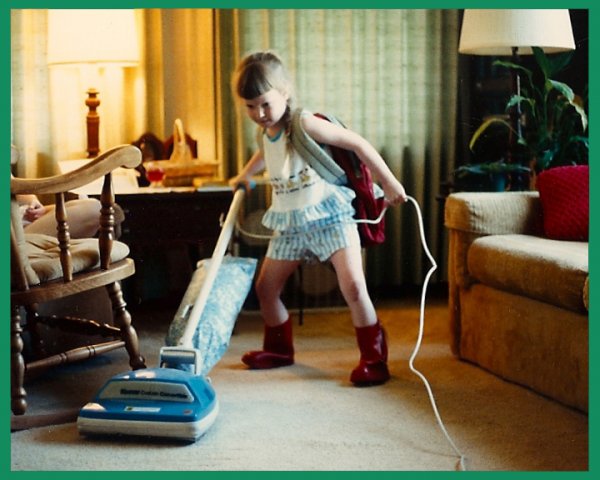
- Ask the child to do small chores in the house. Break up a big task into multiple tiny ones and wait patiently for them to complete and support them when needed.
- Do not restrict the child from playing with others. Let him/her play with children with Down syndrome and others. Let the child blend in and enjoy.
- Encourage the kid to learn new things and let them try multiple times to make them better at it.
- Have regular play dates with your child and have fun, read and go out together. These are great for bonding.
- Encourage the child to perform his/her day to day tasks by himself/herself. This will make them confident and independent.
Everyday Tasks
- Make a daily routine for the child to follow every day and stick to it.
- Help the child by including a clear indication while switching from one activity to another like seeing a picture or a song.
- Visual memory is better than verbal memory in children with Down syndrome so create a flow chart of daily routine with pictures for the child to follow.
- Let your child make small decisions like picking their own clothes to wear, etc.
- Encourage the child to take small risks, which will help to boost their confidence.
With School
- When he/she makes a mistake, instead of using a negative phrase ‘That’s wrong’, use something more positive like ‘Let’s try it again’. This will sound more supportive and the child feels encouraged.
- Try to bring in sync between what the child learns at school and figure out a way to bring in those learning in your home.
- If the child has trouble making friends at school or approach a problem. Do not try to intervene and fix it, instead let the child fix it, but provide them with the support that they need to get through it.
Where to Get Help?
It can be challenging bringing up a child with Down syndrome. The doctor can help you out by referring to a specialist and there are many hospitals today where all the specialists that child will need are under one roof. It can be overwhelming at the beginning for parents, but the only solution for this is sharing. Share your story with other parents who have gone through and seek help. There are communities of parents, who have actually been there and understand what you are feeling. Here are some of the groups that can help you:
- Down Syndrome Federation of India
Some organisations in India are dedicated to helping children and people with Down syndrome. One of them is Down Syndrome Federation of India, it offers daycare to individuals affected with Down syndrome and those who need special care. They are also in the Middle East and provide support services like counselling to parents, physiotherapy and speech therapy. Their main aim is to work towards spreading awareness and acceptance of children with Down syndrome and the diseases that come along with it.
Website: www.downsyndrome.in
Email: mathrumandir@gmail.com
- Down Syndrome Care Association
The main focus of this organisation is to help families learn to live with the condition and care for the individuals affected. They do this by conducting programs and coaching the parents and affected individuals.
Website: www.ds-int.org
Email: drchopade@dscaindia.org
- Parents of Down Syndrome
New parents are the ones who actually require a lot of help, in the beginning, to cope with the situation of the child as it is an unexpected situation for them. This help and support is given by this organisation as they help parents accept the condition and be appreciative of their child.
Website: www.podsindia.org
Email: podsindia@rediffmail.com
Therapies for Downs Syndrome
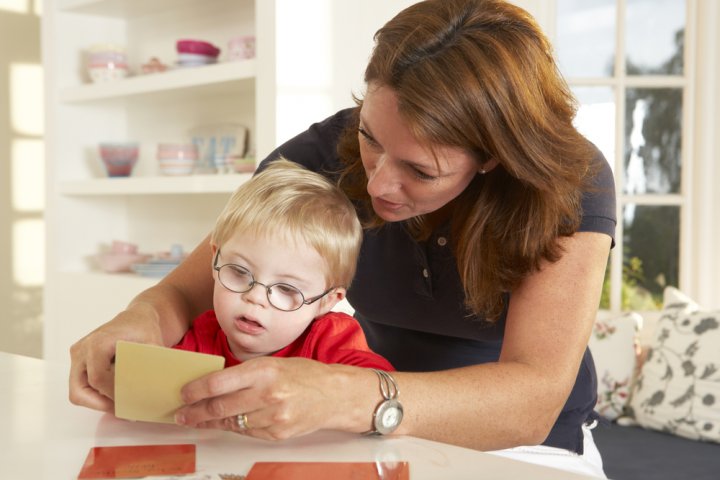
Although no cure is found yet for Down syndrome, there are various therapies that can help improve the quality of life. The sooner therapies starts the better because children learn basic motor and developing skills at the early stages of life. Various therapies can be started even before the child starts going to school. These therapies are based on the factors like age, health, limitations and strengths.
- Speech Therapy This is one of the first therapies that can be given to child with Down syndrome right from the infant stage. It focuses on articulation, cognition and strengthening of the oral muscles to help the child improve communication and language skills.
- Occupational Therapy This therapy focuses more on the aspects of the individual’s motor skills and helping them to lead a healthy lifestyle and navigate the society. These therapists work on improving the skills through daily tasks like brushing the teeth and getting dressed at first. As the child grows, focus is on skills like writing and computer education.
- Special Education Children with Down syndrome have special needs and need special education. Some schools and establishments cater to these needs and implement a special teaching method for these kids so that they learn better.
- Physical Therapy Individuals with Down syndrome tend to have poor muscle strength and smaller hands, which will make the person move slower. Physical therapy focuses on strengthening of these muscles and toning them. This will improve coordination and balance. A proper physical therapy regimen on day to day basis can also result in correcting the posture.
- Assistive Technology These are the devices that help the individual function better even with disabilities. Like hearing aids, pen grips, walking aids, large button mobile phones and keyboards, etc. Touch screen devices are more appropriate for kids with Down syndrome as they struggle with motor skills.
Activities for Downs Syndrome Child

Children with Down syndrome has the ability to become contributing and self-supporting members of society. Though they experience considerable delays in speech and development, with the aid of a few activities you can encourage and also understand them. Pick the activities that match their skill level and interests. Activities can also be a hobby or a sport.
- Painting Painting is a way of expressing emotions and this also helps the child with coordination between hand and eye. It helps in awareness development by giving them an opportunity to be creative and imaginative. This activity can be relaxing for the child and at the end of an artwork, it brings a sense of confidence in them.
- Music Music helps children with Down syndrome retain memory better. Use music in their daily routine to create positivity and keep the musical toys handy for them. Try to get them a proper musical training if they show interest in a particular instrument. This will boost their confidence and creativity.
- Sports Though they need special attention, treat a child with Down syndrome as normal as possible. It helps them feel normal around other children and be mentally strong. Sports can be a great way to learn social skills and improve their physical strength. Hopping, cycling and running can be a great start in this aspect.
- Travel Travelling is a learning experience for the child with Down syndrome. Sight-seeing and meeting new people will help them in developing visual memory and communication skills. Travelling allows them to explore and understand the world. This is a great educational experience for the child.
-
 Entice Your Picky Eater Child with our Kid-Friendly Recipes: 10 Easy Recipes for Kids to Enjoy!
Entice Your Picky Eater Child with our Kid-Friendly Recipes: 10 Easy Recipes for Kids to Enjoy!
-
 क्या आप जानतें है,की बच्चे का स्वस्थ रहना और सम्पूर्ण विकाश करना उसकी आदतों पर निर्भर करता है : 12 ज़रूरी स्वस्थ और सेहमंद आदतों की सूचि जो उन्हें स्वस्थ रहने में मदद करेगी । (2020)
क्या आप जानतें है,की बच्चे का स्वस्थ रहना और सम्पूर्ण विकाश करना उसकी आदतों पर निर्भर करता है : 12 ज़रूरी स्वस्थ और सेहमंद आदतों की सूचि जो उन्हें स्वस्थ रहने में मदद करेगी । (2020)
-
 Eggs Are Among the Healthiest Foods on Earth. Discover 10 Simple Egg Recipes for Your Kids and Amazing Health Benefits of Having Eggs (2020)
Eggs Are Among the Healthiest Foods on Earth. Discover 10 Simple Egg Recipes for Your Kids and Amazing Health Benefits of Having Eggs (2020)
-
 Importance of Healthy Habits for Kids(2020): Key for a Happy and Healthy Life and Everything You Need to Keep in Mind
Importance of Healthy Habits for Kids(2020): Key for a Happy and Healthy Life and Everything You Need to Keep in Mind
-
 Facing the Daily Challenge of Getting Your Kids to Eat Breakfast without Complaining? Not Anymore with Our 7 Healthy Breakfast for Kids and 4 Quick Breakfast Options for Those Time Challenged Days.
Facing the Daily Challenge of Getting Your Kids to Eat Breakfast without Complaining? Not Anymore with Our 7 Healthy Breakfast for Kids and 4 Quick Breakfast Options for Those Time Challenged Days.
Do Not be Anxious! Down Syndrome Doesn't Define Your Child!
With a Down syndrome child, the usual rules and timelines never work. Though they reach all the milestones, they take their own time and usually need some help reaching them. Do not let the condition define your child. Reach out for help and support from the many organizations listed in our article. Be creative in teaching your child. Most importantly do not compare with other children his/her age.

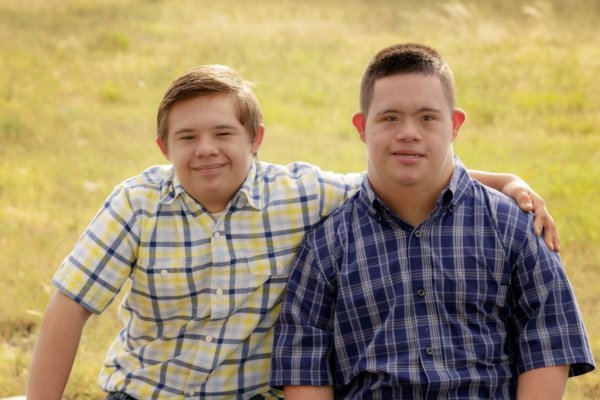
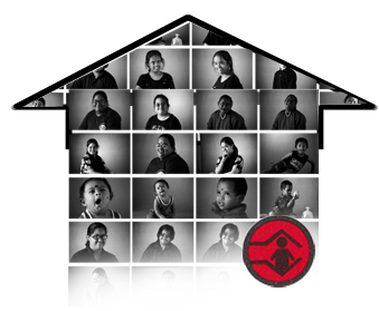
 Highlight the Best Facets of Your Incomparable Beauty: Discover the Best Face Highlighter Currently Available in India and Everything You Need to Know About Using Face Highlighters for Maximum Effect (2023)
Highlight the Best Facets of Your Incomparable Beauty: Discover the Best Face Highlighter Currently Available in India and Everything You Need to Know About Using Face Highlighters for Maximum Effect (2023)
 Forget the Blemishes and Get that Picture Perfect Flawless Radiance on Your Face: Check out the Best Foundations for Oily Skin Currently Available in India and Everything You Need to Know About Makeup Foundations (2023)
Forget the Blemishes and Get that Picture Perfect Flawless Radiance on Your Face: Check out the Best Foundations for Oily Skin Currently Available in India and Everything You Need to Know About Makeup Foundations (2023)
 Make Your Presence Felt Wherever You Go: Discover the Best Perfumes Under 2000 for Both Men and Women to Announce Your Arrival and Make Any Occasion Memorable (2023)
Make Your Presence Felt Wherever You Go: Discover the Best Perfumes Under 2000 for Both Men and Women to Announce Your Arrival and Make Any Occasion Memorable (2023)
 Protect Your Oily Skin from the Harmful Rays of the Sun: Discover the Best Gel Based Sunscreens for Oily Skin and Everything You Need to Know Before Buying One (2023)
Protect Your Oily Skin from the Harmful Rays of the Sun: Discover the Best Gel Based Sunscreens for Oily Skin and Everything You Need to Know Before Buying One (2023)
 Minor Blemishes and Wrinkles Affecting Your Confidence? Check out the Best BB Creams to Conceal Your Worries and Nourish Your Skin to Restore the Healthy, Radiant and Glowing Complexion Back Again (2023)
Minor Blemishes and Wrinkles Affecting Your Confidence? Check out the Best BB Creams to Conceal Your Worries and Nourish Your Skin to Restore the Healthy, Radiant and Glowing Complexion Back Again (2023)
